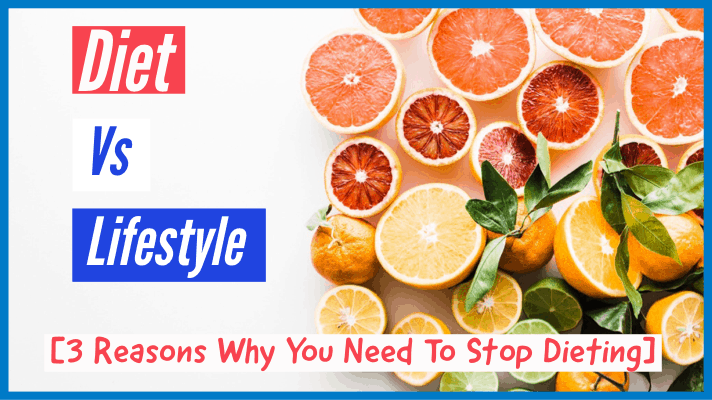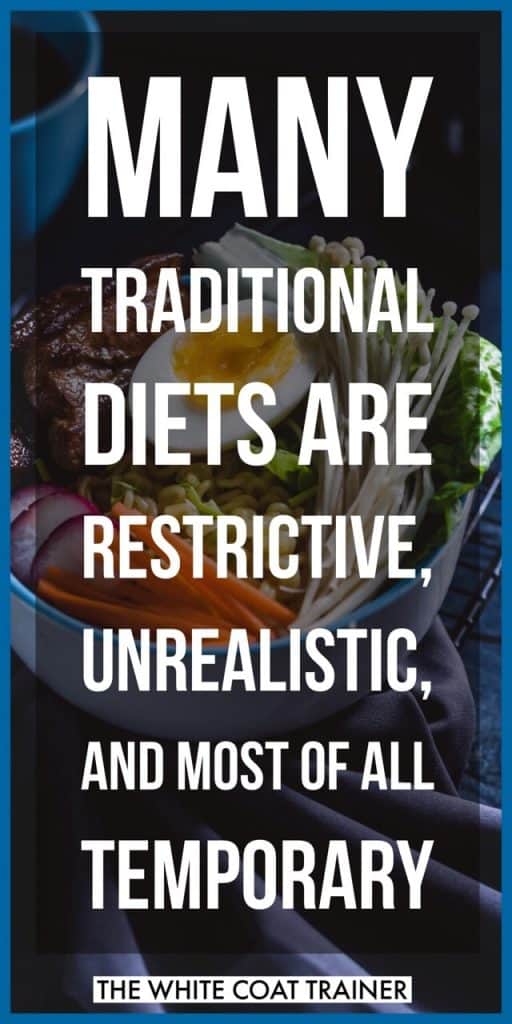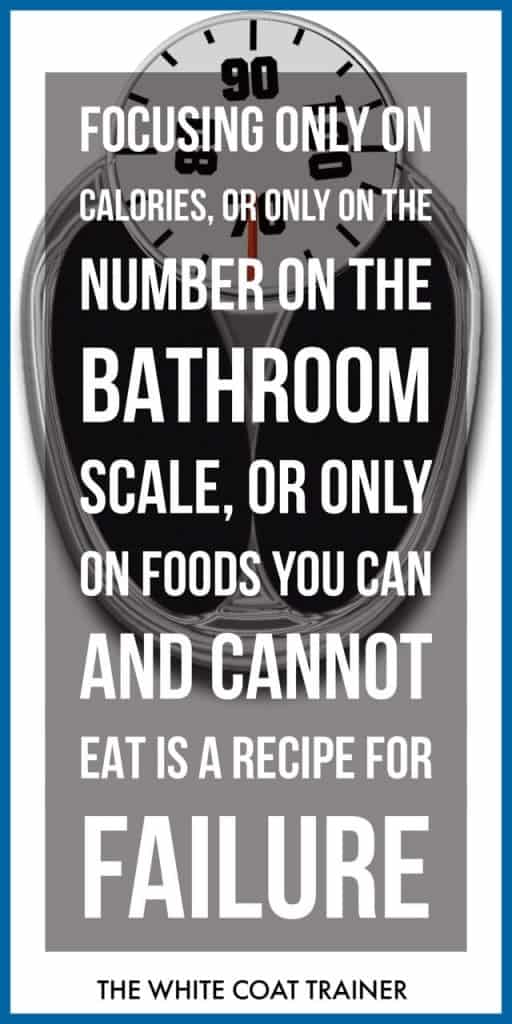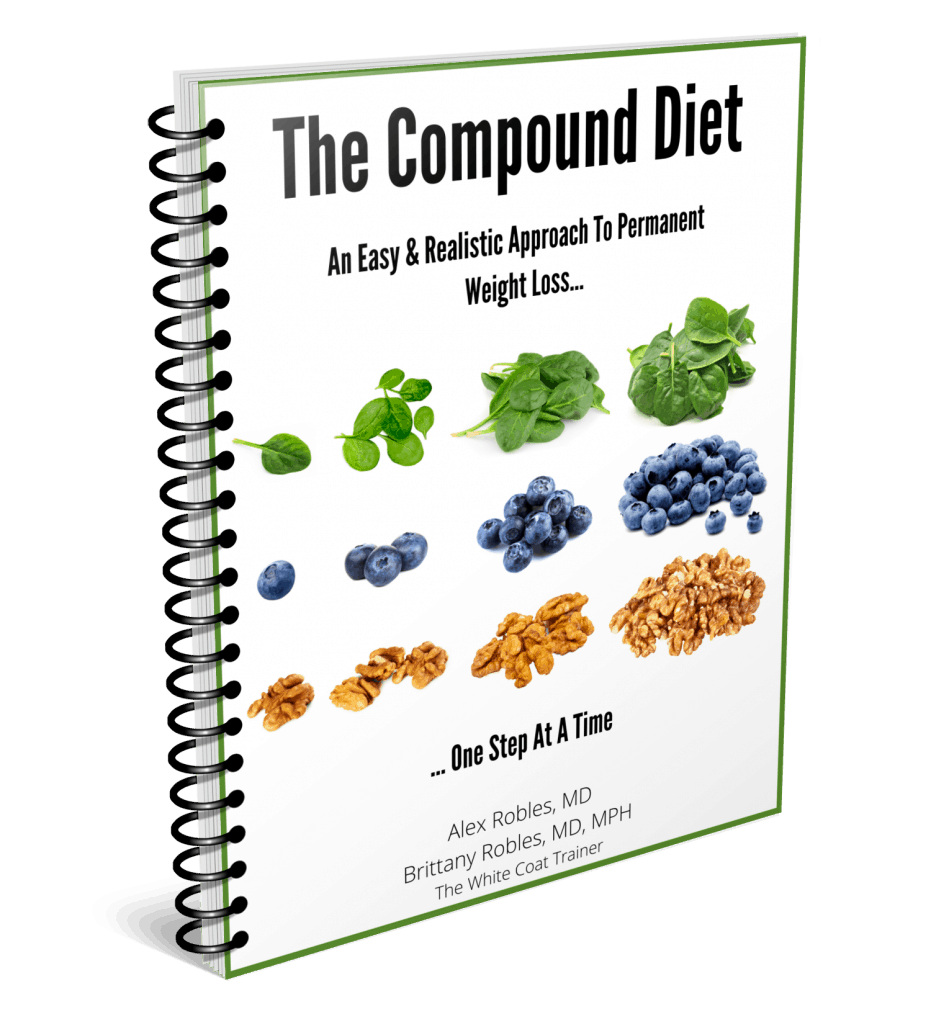What is the difference between a diet and a lifestyle change?
If your goal is to lose weight permanently, then you need to stop dieting and change your lifestyle.
After reading this guide, you’ll learn:
- Why you need to stop dieting
- How to tell the difference between a diet and a lifestyle
- Simple strategies to make permanent changes to your eating habits
So what’s more important? Diet vs lifestyle?
Let’s dive right in.

This Is Why You Shouldn’t Diet – [Ever Again]
Have you ever been excited to start a diet on Monday, only to realize you gave up by Thursday?
You’re not the only one.
If you’ve ever struggled to stick to a diet for any amount of time, it’s not your fault. Not many people can.
Diets in general, are specifically designed to be temporary.
That is really important for you to understand. Read that sentence again if you have to.
Dieting forces you to create a mindset that you are going to eat a certain way, for a finite amount of time.
I.e there is an end goal in sight.
Whether you achieve that goal or not, your plan is to stop the diet sooner or later.
If you didn’t already know your body is great at adapting. Once you stop dieting, it will quickly adapt back to your regular eating pattern.
Whatever results you did achieve from the short-term diet will quickly disappear.
Did you ever hear what happened to the contestants on “The Biggest Loser?” To catch you up to speed, these contestants lost a tremendous amount of weight in a short amount of time.
They used aggressive diets and intense exercising to achieve their results.
But as with all diets – it had an end date.
Once the contestants reverted back to a normal eating pattern, most of them wound up gaining back a significant amount of weight. [1] In some cases, contestants gained more weight than when they started.
That is unfortunate.

In fact, studies show that approximately 80% of weight loss is regained in a few years. [2]
Why?
Because diets are meant to focus only on the short term. They have an end date.
Healthy weight management isn’t meant to have an end date.
But aren’t some diets healthy?
Is Being On A Diet Healthy?
So this begs the question- aren’t some diets healthy?
It depends on how you define healthy.
When most people diet, you tend to create very unhealthy mentalities.
The All Or Nothing Mentality
The first is what I like to call an all or nothing mentality.
Foods are classified as either all good or all bad. If the food is bad’ you must avoid it at all costs, and if the food is “good” you can eat lots of it.
It’s either black or white with no gray in between.
| If you’re on keto – carbs are bad. |
| If you’re paleo– grains are bad. |
| If you’re old school – fats are bad. |
| If you’re a millennial – gluten is bad. |
| If you’re carnivore – plants are bad. |
| If you’re vegan – animal products are bad. |
and so on…
I would argue that this all-or-nothing mentality is not “healthy.” (While I personally don’t eat meat, I don’t label this food group as bad. I have my own personal reasons for not eating it.)
The Calorie Mentality
Second of all, some diets tend to focus all of their time and energy on calorie counting.
While it is absolutely true that you need to be in a caloric deficit to lose weight, putting all of your eggs in the calorie basket is mentally draining.
Calorie counting is boring, time-consuming, and often inaccurate. It also categorizes food strictly as numbers.
I.e you’re forced to assign foods a numerical “grade” purely based on their caloric value.
Calorie counting can create the mentality that food is seen purely as fuel and nothing else.
This in my opinion also isn’t healthy.
The Scale Mentality
Lastly, when you are on a diet – you only seem to care about one thing. The number on the scale.
Sadly, people will do a lot of crazy things just to get the number on the scale to go down.
Here’s why that’s a mistake: The number on the scale is influenced by so many variables.
- How hydrated or dehydrated you are can impact the number on the scale.
- Whether or not you have pooped can impact the number on the scale.
- Whether you ate a large meal recently can impact the number on the scale.
What I’m trying to say is, your weight loss doesn’t always represent fat loss. Obsessing with the number on the scale is not healthy as it forces you to focus on the wrong things.
You must avoid looking ONLY at the scale for your progress.
Instead, you should ask yourself three questions.
- How are my food choices making me look?
- How are they making me feel?
- Are the choices I’m making something that I can stick to in the long run?
After you ask yourself these questions, let’s talk about what you should do instead.
It all boils down to one solution.

The Solution To Make A Permanent Change In Your Life
If your goal is to lose body fat (and keep it off permanently), you need a permanent solution.
And fat loss might mean different things to you:
- Maybe it’s finally being able to walk to the supermarket and not get out of breath,
- Or finally fitting into those old pair of jeans that used to fit nicely around your waist.
- Or maybe you never want the first number of the scale to be a 2
Either way, the key to achieving weight loss success is to create a lifestyle change.
Lifestyle changes are for the long term. By definition, they are meant to be permanent changes to your daily routine.
You aren’t bound by specific rules of what you can and cannot eat.
You aren’t bound by a specific deadline. Or your friend’s wedding that’s happening on the beach this June.
You aren’t screwed if you go out to a restaurant and they don’t have “low fat” foods. You don’t have to feel guilty when you go away on a vacation.
A lifestyle change is a conscientious choice to eat a certain way most of the time.
Notice how I said, most of the time.
Perfection isn’t necessary. When you make a lifestyle change, it’s the sum of all of your work that matters, not how many days were you perfect.
That’s why lifestyle changes are long term solutions.
So What Is The Difference Between Dieting and Eating Healthy?
So if you’re going to stop dieting, what should you do instead?
You need to think long term.
Imagine how different your life would be 5 weeks from now, then 5 months from now, then 5 years from now.
Do you really want to continue on the path of yo-yo dieting and making crazy changes to your diet for a short period of time?
Here’s how you should start changing your mindset.
Stop Placing Labels- Create Balance
Stop labeling foods as all good or all bad.
You need to consume ample amounts of every single macronutrient.
You need to consume protein. You need to consume fats. And yes, you need to consume carbohydrates.
Find foods from each macronutrient that you enjoy that are considered healthy by most. These foods will make up the staple food groups of your nutrition plan.
Don’t Make The Same Mistake All Diets Make
The next thing you have to do is understand the importance of moderation.
Most diets fail because they are simply too restrictive. Limiting the number of foods you can eat will create feelings of deprivation.
There is no need to deprive yourself. This is counterproductive.
If you really enjoy chocolate – let yourself have some from time to time. The same goes for a pizza, or cake, or a glass of wine.
Understand that these food choices aren’t going to make or break you. Your progress is going to come from the cumulative sum of everything you do.
Remember, we are in this for the long haul.
It is also important that you don’t go overboard. Understand that moderation is key.
Do not indulge in your treat meals more than 10-15% of the time. If you eat 3 meals a day- you’re consuming ~ 21 meals per week.
So 10-15% of 21 is 2-3x a week, max.
You don’t have to be the awkward person at a social gathering who cannot enjoy anything.
Budget these items into your lifestyle.
Know Which Foods Promote Health
Last but not least, creating a healthy lifestyle means you need to eat foods that promote health.
Unless you live under a rock, you should know that fruits and vegetables make up the healthiest foods on the planet.
What makes them healthy? The fact is that they are low in calories, high in volume, and abundant in nutrients.
What this means is that you can usually eat a lot of them, while keeping your caloric intake low.
Does this mean you should eat all the fruits and vegetables you possibly could?
No.
Find fruits and vegetables that you actually enjoy eating and stick to those.
That’s it.
If you hate broccoli. Don’t eat broccoli. But if you don’t mind carrots, then eat carrots.
Have the fruits and vegetables that you enjoy readily available in your house at all times.
Put them front and center in your refrigerator. Keep them visible, no higher than eye level.
You don’t only have to do this for fruits and vegetables.
To recap:
This is the 3 step process that you should follow for all foods that promote health.
- Make a list of the ones you actually enjoy eating.
- Buy them often and have them readily available in your house
- Keep them visible- at or below eye level.
How To Make The Ultimate Diet Lifestyle Change
Ok, so now we need to take all of this information to help you create a lifestyle change.
First and foremost, you need to change your mindset.
These are the three rules you need to live by.
- You need to stop dieting: diets tend to create unhealthy eating behaviors
- You don’t need to create unrealistic restrictions: moderation is key for mental sanity and social events
- Your progress is dictated by your long term choices
Read these three rules again, and again, and again.
Write them down and put them on your fridge.
Understand them, and most of all, integrate them into your beliefs.
Ok.
Now that you have the mindset, it’s time to select your foods.
Create a list of the foods that you enjoy using our post on how to lose weight without starving.
Make sure that you include foods from all three categories – proteins, fats, and carbohydrates.
Now that you have this list, it’s go time.
Next, You Build One Habit
The most effective way to start making a lifestyle change is to build small habits.
A small habit is something that you can do on a daily basis that doesn’t interfere with your lifestyle.
This translates into picking one of the foods you enjoy and finding an easy way to integrate it into your daily meals.
Don’t set the bar high. Pick a small change that you know you can do, no matter what.
This is how you build momentum. Accomplishing this change will create a quick win that you can celebrate and benefit from.
Over time, you continue to make one small change – creating multiple small habits that build upon themselves over time.
The WCT Diet
By the way, this is what we have been working on over the last few months.
A comprehensive, step-by-step weight loss program that is designed to help you create a realistic and sustainable lifestyle change.
You’ll learn exactly what you need to eat, especially if you are always hungry.
In fact, these are the exact same methods Brittany and I have used to develop a healthy lifestyle while working 80 hour work weeks.
Wrap Up
So there you have it.
That is the difference between a diet and a lifestyle change.
Have you been dieting your whole life? Have you ever attempted to make a lifestyle change?
Comment below and let us know.
Next, You Should Read:
- Diet Vs Exercise: What Matters Most?
- 3 Key Principles You Must Know About Dieting
- How To Lose Weight Without Starving

Alex Robles, MD, CPT / Brittany Robles, MD, MPH, CPT
Alex & Brittany Robles are physicians, NASM Certified Personal Trainers, and founders of The White Coat Trainer: a resource dedicated to improving the health and fitness of busy professionals using time-efficient strategies. Their advice has been featured in My Fitness Pal, Prevention, Livestrong, Reader’s Digest, Bustle, The Active Times, and more. Learn more about them here.
REFERENCES
1) Fothergill, Erin, et al. “Persistent metabolic adaptation 6 years after The Biggest Loser competition.” Obesity 24.8 (2016): 1612-1619.
2) Hall, Kevin D., and Scott Kahan. “Maintenance of lost weight and long-term management of obesity.” Medical Clinics 102.1 (2018): 183-197.

